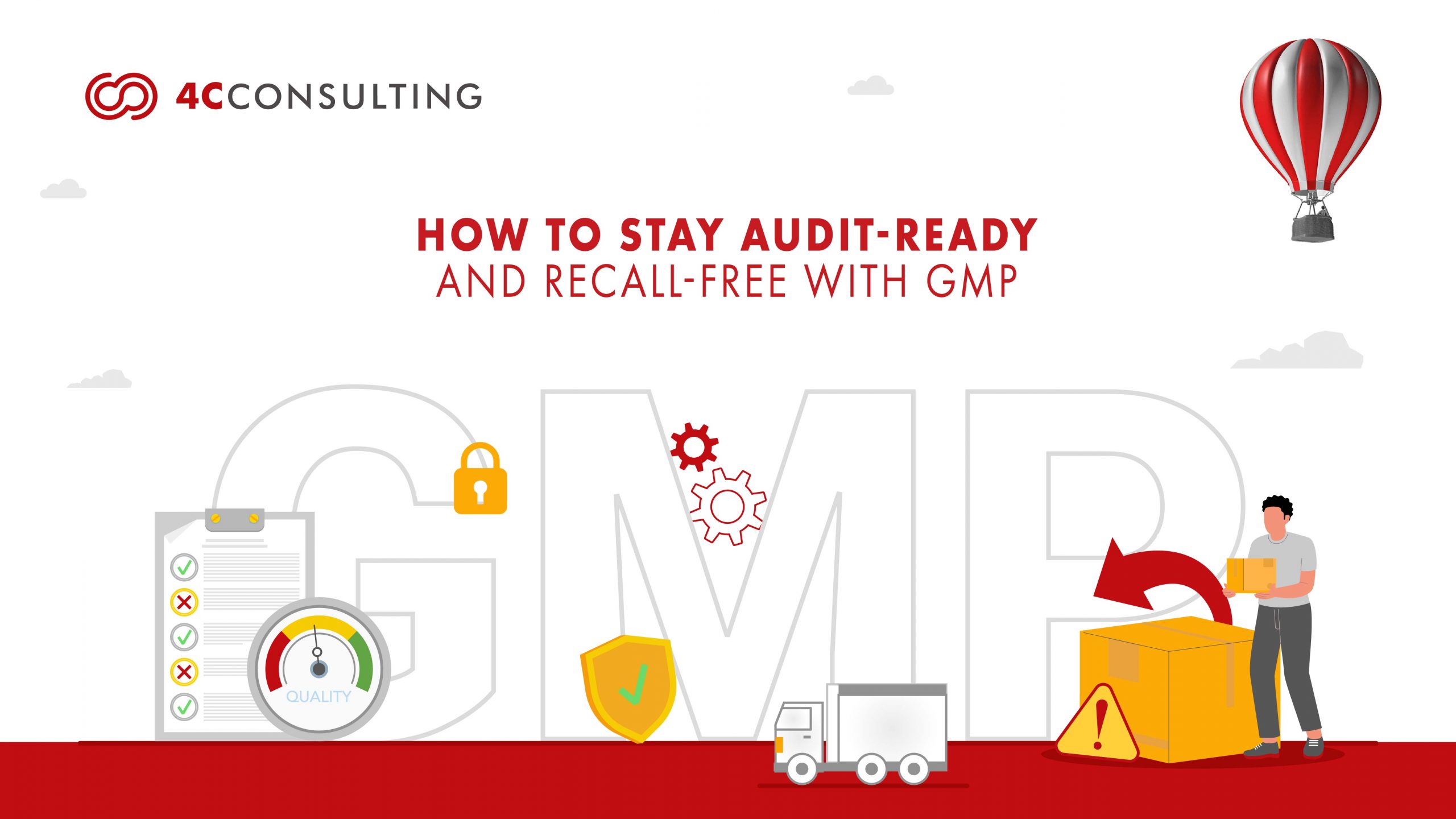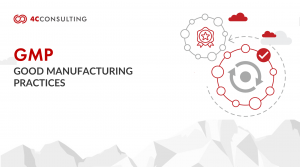
How to Stay Audit-Ready and Recall-Free with GMP
10th Nov, 2025
The FDA reports around 400 product recalls each year due to weak documentation, hygiene lapses and non-compliance with Good Manufacturing Practices (GMP). In industries like pharmaceuticals, food and nutraceuticals, even a minor deviation from GMP standards can trigger rejected batches, supply disruptions or brand reputation loss.
A robust GMP certification framework ensures that every process from raw material handling to final packaging meets global standards for quality, safety and hygiene. By partnering with experienced GMP certification consultants, organizations can strengthen documentation, implement an effective GMP audit checklist and stay inspection-ready for FDA or FSSAI audits. When embedded effectively, Good Manufacturing Practices protect consumer trust, minimize compliance risk and help businesses operate with consistency, efficiency and zero recalls.
What Is GMP (Good Manufacturing Practice)?
Good Manufacturing Practice (GMP) is an internationally recognized system that ensures products are consistently manufactured and controlled according to established quality and safety standards. It covers critical aspects such as facility design, equipment calibration, sanitation, personnel training and process validation ensuring that every product is safe, effective and traceable.
For manufacturers, achieving GMP certification demonstrates a commitment to compliance, quality assurance and risk prevention. Beyond being a regulatory requirement, it builds operational discipline and embeds continual improvement into everyday processes. A well-implemented GMP compliance system integrates people, processes and documentation into one framework ensuring organizations remain audit-ready, globally trusted and fully aligned with Good Manufacturing Practices guidelines.
How to Stay Audit-Ready with a Strong GMP System
Most product recalls stem from avoidable lapses incomplete documentation, unvalidated processes or poor hygiene practices. A robust Good Manufacturing Practice (GMP) framework eliminates these weaknesses by reinforcing hygiene discipline, documentation accuracy and supplier quality control. When GMP compliance becomes an operational culture rather than a pre-audit formality, organizations achieve continuous readiness and sustain zero-recall performance.
- Strengthen Documentation Control: Comprehensive documentation is the backbone of every GMP compliance system. Real-time, traceable records covering raw materials, in-process controls and finished-product release provide verified evidence of control. Standardized templates, version tracking and digital validation ensure accuracy while preventing data loss. Proper documentation also supports faster retrieval during inspections, enabling smoother regulatory or GMP certification audits.
- Conduct Regular Internal Audits: Structured internal audits are essential to maintaining compliance consistency across departments. Using a detailed GMP audit checklist, organizations can identify deviations early, validate corrective actions and monitor the effectiveness of implemented controls. These routine reviews help align operations with Good Manufacturing Practices guidelines, ensuring ongoing compliance and minimizing non-conformities before external inspections occur.
- Ensure Hygiene and Calibration Control: Clean facilities and calibrated equipment reflect the true maturity of a GMP system. Defined sanitation schedules, validated cleaning procedures and regular environmental monitoring prevent contamination and cross-mixing. Equipment calibration at defined intervals ensures process accuracy and product uniformity. Together, these practices establish a controlled environment that supports long-term GMP audit readiness and regulatory confidence.
- Implement Continuous Employee Training: Competent personnel are at the heart of effective GMP implementation. Routine GMP training builds awareness of quality standards, hygiene expectations and documentation precision. When staff understand both procedure and purpose, compliance becomes a shared responsibility rather than a task. Consistent training also strengthens preparedness for unannounced inspections and sustains compliance under changing operational conditions.
- Maintain Supplier and Material Control: Strong supplier oversight prevents downstream quality failures. Organizations should verify the integrity of raw materials through approved vendor lists, certificates of analysis and periodic supplier audits. Incorporating sustainability and traceability criteria ensures supply-chain reliability. Documented supplier evaluations and performance monitoring enhance transparency and reinforce end-to-end compliance with GMP certification requirements.
By integrating these practices, organizations not only achieve GMP certification in India but also build a culture of preventive compliance that drives operational excellence and customer trust.
How Industries Achieve Recall-Free Manufacturing Systems with GMP
Product recalls often result from avoidable lapses such as formulation errors, contamination or incomplete documentation. However, these risks can be systematically controlled through robust implementation of Good Manufacturing Practices (GMP). Each industry faces unique recall challenges, yet all rely on the same GMP foundation documentation integrity, process validation and hygiene control to ensure audit readiness and product reliability.
- Pharmaceutical Manufacturing: In the pharmaceutical industry, recalls often occur due to cross-contamination, incorrect formulation or gaps in data integrity. Adhering to GMP requires validated cleaning and sterilization procedures, ingredient reconciliation through Batch Manufacturing Records (BMR) and restricted access documentation with audit trails. A well-controlled documentation system ensures traceability from formulation to packaging. For example, a tablet manufacturer prevented recurring deviations by automating BMR reviews and integrating real-time validation before batch release.
- Food and Beverage Manufacturing: Food manufacturers face recall risks stemming from microbial contamination, undeclared allergens or expired shelf-life data. Under GMP, organizations implement Sanitation Standard Operating Procedures (SSOPs), maintain allergen segregation and conduct temperature calibration for cold storage. Each process step is verified through documented logs and microbial testing results. A dairy processing plant, for instance, eliminated spoilage-related recalls by instituting daily sanitation inspections and automated temperature monitoring in compliance with FSSAI guidelines.
- Nutraceutical and Supplement Manufacturing: In nutraceutical production, common recall triggers include incorrect dosage, mislabelling and unverified ingredient claims. GMP mandates raw material verification through Certificates of Analysis (COA), double verification during weighing and dispensing and a two-tier packaging review process. When implemented effectively, these controls ensure ingredient accuracy and prevent labelling discrepancies. A nutraceutical producer recently achieved zero recall incidents after digitizing COA verification and introducing barcode-based batch tracking at packaging.
- Cosmetics and Personal Care Manufacturing: Cosmetic products are prone to microbial contamination and formulation inconsistencies, leading to frequent recalls. GMP implementation emphasizes validated sanitation programs, microbial testing for each batch and controlled formulation worksheets. Regular monitoring of raw material expiry dates and storage conditions further minimizes contamination risks. A skincare manufacturer strengthened its recall prevention system by increasing microbial testing frequency and introducing material segregation based on active ingredient potency.
- Medical Device Manufacturing: Recalls in the medical device sector are typically linked to component non-conformities, packaging failures or incomplete validation documentation. GMP practices aligned with ISO 13485 require maintaining Design History Files (DHF), Device Master Records (DMR) and CAPA logs to ensure full traceability and design verification. One device manufacturer successfully avoided regulatory non-conformities by establishing a centralized design documentation system and performing third-party validation of packaging and sterilization processes.
- Chemical and API Manufacturing: In chemical and Active Pharmaceutical Ingredient (API) manufacturing, the most frequent causes of recalls include process impurities, incomplete cleaning validation and inaccurate batch traceability. GMP control measures involve validated reaction monitoring, intermediate testing and detailed cleaning validation protocols to prevent contamination between product lines. Documentation such as process validation reports, analytical test results and material balance records play a critical role in maintaining product consistency. For instance, an API facility reduced market rejections by enforcing line-clearance checklists and electronic batch recording systems, ensuring every stage met GMP documentation standards.
Across all sectors, recall prevention depends on the consistency and transparency of GMP systems. Whether in pharmaceuticals, food or nutraceutical manufacturing, organizations that maintain validated processes, hygienic operations and traceable documentation are better positioned to remain audit-ready and sustain long-term compliance. Organizations navigate GMP as a strategic framework to align production discipline with global quality standards and build a foundation for zero-defect, recall-free performance.
Benefits of Implementing GMP Certification
- Fewer Recalls: A well-implemented GMP system prevents contamination, process deviations and labelling errors that often lead to costly recalls. By enforcing documentation control and routine monitoring, organizations maintain consistency, traceability and full audit readiness across production lines. It builds a preventive culture where quality assurance becomes part of every operation, not just an inspection goal.
- Stronger Reputation: GMP certification reflects an organization’s integrity and commitment to safe, high-quality products. It enhances credibility with customers, regulators and global buyers, helping businesses build long-term trust and secure repeat opportunities in competitive markets. Over time, this reputation translates into stronger partnerships and higher market preference.
- Consistent Quality: Standardized operating procedures, equipment validation and controlled production environments ensure every batch meets defined specifications. This consistency reduces variation, strengthens product reliability and improves customer satisfaction. Regular process validation and in-process checks reinforce a cycle of continual quality improvement.
- Operational Efficiency: GMP implementation simplifies workflows, minimizes waste and reduces rework or downtime. Clear roles, routine audits and traceable documentation improve productivity and create a culture of accountability across departments. Efficiency gains not only reduce operational costs but also improve overall production turnaround times.
- Global Compliance: As a globally accepted quality framework, GMP certification facilitates smoother approvals from agencies like FDA, FSSAI and WHO. It enables market expansion, vendor approvals and easier access to international supply chains. Organizations that align with GMP standards position themselves as globally trusted, audit-ready suppliers.
Achieving and maintaining GMP certification is not merely about passing an audit it is about creating a culture of consistency, accountability and preventive quality. Whether in pharmaceuticals, food, nutraceuticals, or chemical manufacturing, Good Manufacturing Practices integrate process control, hygiene discipline and documentation accuracy into every production stage. Organizations that invest in structured GMP compliance consulting not only stay inspection-ready but also minimize the risk of recalls, safeguard brand reputation and ensure global market acceptance. By partnering with experienced GMP certification consultants, businesses can transform compliance into a competitive advantage building systems that deliver safety, reliability and trust in every batch.
How 4C Consulting Can Help Your Organization Achieve GMP Certification?
With over 15 years of experience, 10,000+ training hours and 50+ implementation workshops, 4C Consulting empowers organizations to strengthen their GMP systems, documentation and audit readiness in line with FDA and FSSAI requirements. Our certified GMP consultants provide end-to-end support from gap assessment and process validation to internal audits and certification readiness ensuring faster implementation, sustainable compliance and reduced recall risks. Book your 1-Hour Free GMP Consultation today to begin your journey toward recall-free manufacturing excellence.
FAQs
How often should GMP audits be conducted?
Internal GMP audits should be performed at least twice a year to identify gaps, verify documentation and ensure audit readiness before external inspections.
What documents are required for GMP certification?
Key records include SOPs, validation reports, cleaning logs, calibration certificates and training documentation forming the core of the Good Manufacturing Practices certificate review.
What is the cost of GMP certification in India?
The cost of GMP certification in India depends on several factors such as the organization’s size, number of manufacturing units, process complexity and audit scope. Typically, it includes expenses related to documentation, gap assessment, employee training and certification audits. Engaging experienced GMP consultants ensures cost-effective implementation and smooth certification without operational disruptions.
How does GMP help in preventing recalls?
By maintaining traceability, process control and hygiene standards, GMP compliance consulting ensures that every product batch meets regulatory and safety requirements.
What industries benefit most from GMP certification?
Good Manufacturing Practices are critical in the pharmaceutical, food, cosmetic and nutraceutical industries, ensuring safe, consistent and compliant products across global markets.

